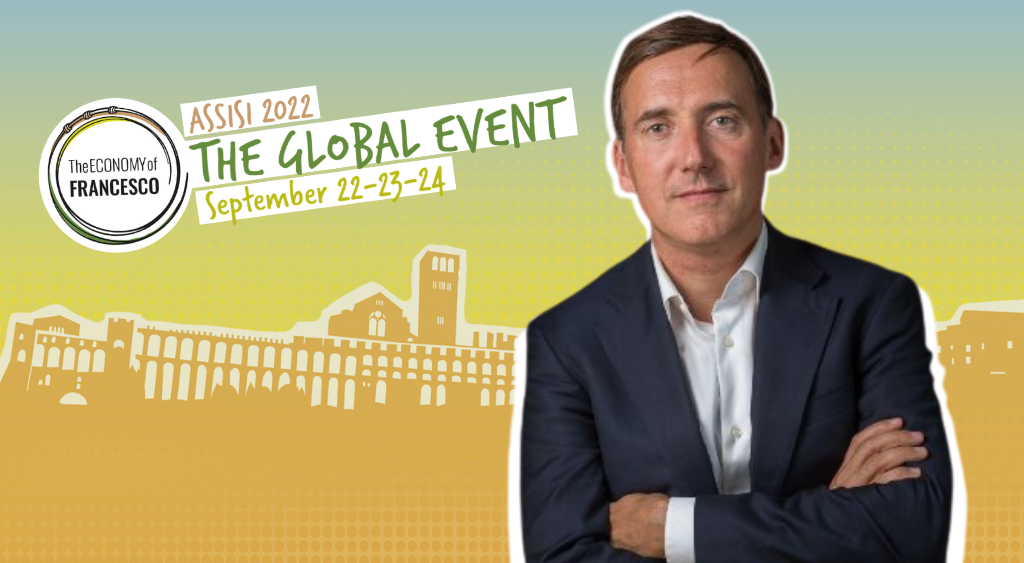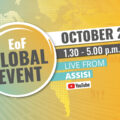
Watch
Gaël Giraud: “Fighting crisis is not one-time battle, but a long one”

We continue with our series of interviews towards the Global Event of The Economy of Francesco. We are incredibly happy to have spoken with Gaël Giraud, a French Jesuit economist who specializes in general equilibrium theory, game theory, finance, and energy issues. Founding Director of the Georgetown Environmental Justice Program, he has collaborated with the Economy of Francesco as Senior Member of the Agriculture & Justice Village.
In 2013, together with Cecile Renouard, you authored a book entitled «20 proposals to reform capitalism». From that moment on, the world has changed a lot. With just mentioning the pandemic and the current armed conflicts. But also, thanks to Laudato si’, with all its repercussions, new visions of the economy that have flourished. Yet the challenges have grown faster than the transformative proposals towards a new economy, towards a greener and fairer world. So, our question is, What are now the four key points that the EoF should keep in mind if it genuinely wants to transform the economy?
That is a good question. So, if I have to mention only four points, let me think about them. I guess one point would definitely be the commons, “i beni comuni” in Italian; “bienes comunes”, ¿cómo se dice en castellano? ¿Bienes comunes? This is a way to understand that a big issue is the governance, and governance at different levels of societal life such as international, corporate, state, etc. How do we take care of our common goods at the global level in regarding air, climate, biodiversity, fishing, oceans, bees, and so on? So, this is the first point.
The second point certainly is that we would need a proper regulation of the financial world. My point of view is that the main enemy of the ecological transition towards a low carbon society is the financial world. Why? Because they have a lot of fossil function assets, and to such function assets are the fossil fuels related. Many banks know that if they were bought, and if they decide tomorrow morning that fossil fuel is a certain asset, they will be all in bankruptcy. So, we need to fix this problem, we have to fix finance.
The third point is obviously the ecological transition itself. That is how we put into practice a just path from today towards societies based on renewable energies. There are many ways to do it. I have published a report for France showing that it would cost about 2% of the national GDP every year. Only 2%, but it’s 2%, nevertheless. We can do the same exercise for each country. But then the main question is how to implement this in a just and fair way to avoid having it paid once more by the poorest of the society who already pay the bill of the ecological transition.
And then the fourth point certainly I would say, is to reinvent labour.
Decent labour in the sense of the ILO (International Labour Organization), but also labour as the way of socialization; labour as “buen vivir” in the sense of Latin American; labour in the understanding of Shona language in Zimbabwe which relates it to the people, to nature, to the ancestors, etc. And also, labour as experience, in the sense of Swaraj in India. That is the way we can teach ourselves, learn self-control and self-limitation. So, these are the four points.
In the first point you mentioned the common good and in one article that you wrote recently, you pointed out that the four principles towards the common good and peace by Pope Francis in Evangelii Gaudium could be an interesting source of inspiration for young people like us who want to rebuild the economy starting from a real world. So, we wish to understand why you do think so. Could you deepen more on this?
Certainly! First of all, we have to make a distinction between the common good (singular) and commons (plural), because these are two distinct things.
The common good is a concept in the Christian tradition, the Catholic tradition that goes back at least to St. Thomas Aquinas, the great Dominican of the 13th century. It means something like the universal interest, the universal good for everybody, but with the Christian endeavour to this.
Whereas the word commons has the sense of any specific way to organize the governance of a number of resources, both material and immaterial. We have to keep the distinction. Regarding what I wrote in my paper in La Civiltà Cattolica (A Catholic Magazine), I affirmed that there are four principles emphasised by Pope Francis in Evangelii Gaudium. But you can find them everywhere and in everything that the Pope wrote.
The first one is that time matters more than space, which is a way to say that we have to think dynamically, that we have to think in terms of history and in terms of trajectory.
We should give up the hope to fix a problem from one day to another because this will not happen this way.
I just give you an example. The Prime Minister of France declared in a speech before the French Parliament, “We shall win the climate battle”. This is simply wrong. It is not a battle; it is not a one-time battle. It is a long-term process with some progress, and some regression. It is a gradual process. So, time matters, and we have to think in terms of the time-sensitive process. Thus, that is the first thing. The second one that the Pope emphasizes is: the whole is greater than the part. That is, the whole is not the sum of its components. It is bigger than that. It is a way to say when we are together, we can do something which is much bigger than the sum of what each of us could achieve separately. So, there is really something in cooperation and collaboration that makes things possible. Otherwise, it would just be absolutely impossible.
Now, the third principle, you guess, that he emphasizes is unity. Unity prevails over conflict. Unity matters more than everything else. That is particularly important for him, for the Church, in the sense that definitely Pope Francis does not want to divide the Church. He is not the one creating motives for divisions, but essentially people who disagree with his perspective, and then generate a polarization of the Church. But this is true also for society and for the economy. That is, we have to do things together. And this is especially important today due to the huge challenge raised by the climate crisis.
My experience from what I see is that some members of the elite, the social and economic elite, are de-solidarizing themselves from the rest of the crowd. And they just dream of a world where they would live some ghettos protected from everything else, and where they would have privileged access to energy and substance, while the poor would just be starving. So, this is not a way to say that unity is a pretext for everything. So, the poor reminds us that we need to think together, or that we are not doing that actually. We are all in the same boat. Unity matters.
And the fourth one: Realities are more important than ideas. This is to say that there is a need for a kind of realism.
Let me give you an example. There are still a number of people on this planet, economists, who believe that it is possible to have green growth, and to make profits, while addressing the climate change issues, thus, satisfying everybody.
This is just completely unrealistic, all the simulations that we run at the Environmental Justice Program tend to show that business is usually a scenario that leads to a global collapse. So, what is unrealistic, what is completely ideological is to believe that the modern productivism and extractivism that we inherited from the Industrial Revolution could still continue its way the coming decades. This would just not be the case. Therefore, realism and reality matter more than ideas.
Our last question: How to coordinate the line of action together as young people to build up The Economy of Francesco?
Georgetown University wants to offer to you and to all the youngsters who are enthusiastic to work within the paradigm of The Economy of Francisco, a website where you could write what The Economy of Francesco means for you. I know that there is a good number of people ready to say something about The Economy of Francesco. But it is not true because we do not know what it actually is. You, young people, you have to invent The Economy of Francesco. When the Pope shared this inspiration more than two years ago, regarding what we now call The Economy of Francesco, he affirmed that the current economy is killing the planet, and that we needed to reinvent the economy. And that is your mission, and I invite you to accomplish it. But the Pope does not know what it is. Even the book itself does not say anything. Even God himself does not know. You have to invent it. That is why my suggestion is to have a website hosted by Georgetown University because it is serious economics, it is not typical economics as a number of economists would claim it is. And starting the website from scrap, you would write yourself what it means for you with your own experiences.
In the village of agriculture and justice, as I remember, there is an organic farm in Brazil which is working. You could provide some feedback on the experience of this farm on this website. And I know there are other experiments that are implemented in Sub-Saharan Africa. We could also have feedback for participants on this website. Step by step, this would provide us with a bigger picture. And what Georgetown University could do is provide a coordination. We could help organize the meetings: maybe a meeting in Latin America, another in Africa, a third one in Southeast Asia, and all this in one year and a half or two years. Once this is done and we more or less have the wide picture, then we could organize a great event and talk to the Pope as we are going to do on 24th September. My suggestion is that in one year or two, we may talk to the Pope. Now, you called us to tell you what the Economy of Francesco is. Well, that is our answer. That is the way I would understand the coordination, otherwise there is a small risk that you are so creative that everybody has an objective in a different direction, without providing a unified picture.
And if we want to have a consistent, systematic, unified picture, we need a little bit of coordination. That is the way I would try to promote coordination.
Thank you very much Gaël, and to close this interview, we would like to ask you to offer some final words to the youth preparing to be in Assisi for The Economy of Francesco.
Well, I shall meet with you over there, I shall join you! I am incredibly happy about that. This is especially important, and we should not be impressed by neoliberal economists who claim that what we try to do is not serious. The work I am doing at Georgetown University is much more serious than anything that these new liberal economists have done so far. And I am sure the kind of creativity and imagination that you have is much more significant. Actually, you are the future of the planet, and you are the future of the economy of this planet. We truly need you in order to have a new understanding of economics. Otherwise, the tradition in classic and neoclassic economics will just lead us to the collapse which is already unfolding in terms of fighting. You know that there is water rationing today in the south of Italy. And we know that if we do not do anything, there will be a lack of access to drinkable water in Italy by 2040. Italy in 20 years may be in the situation of some parts of India today. Poor people in the centre of India does not have any access to water.
Therefore, if you want to avoid that, and if you want to foster a new and prosperous economy where everybody is happy, we need you to engage in reinventing it.
See you in Assisi, Ciao!






